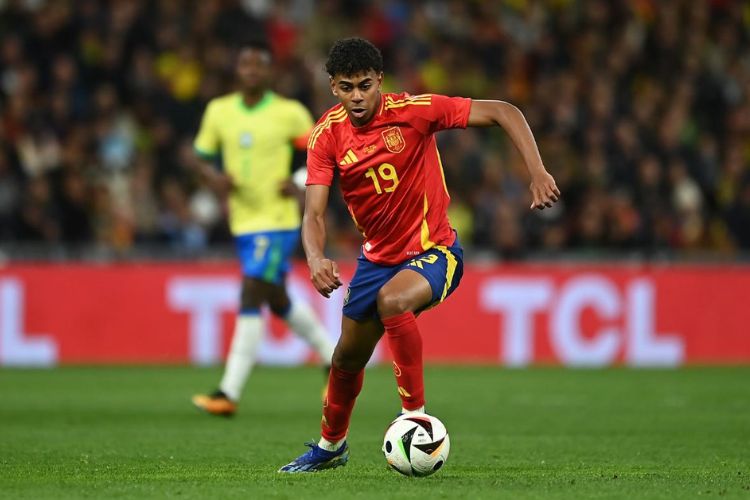
Yamal’s talent is already being compared to Lionel Messi since last April, especially in Barcelona's La Liga match against Real Betis.
It is not only Luca Modric, Lamine Yamal is going to be one of the key attractions in Spain’s opening Group League match against fancied Croatia in EURO today, on Saturday.
Not only for being the youngest footballer in the ongoing EURO but football lovers worldwide will be looking at the 16-year-old Barcelona winger intently for his talent.
Yamal’s talent is already been compared to Lionel Messi since last April, especially in Barcelona's La Liga match against Real Betis. Yamal tore apart his opposition by his astonishing speed and immaculate control and skill on his left foot operating down the right, just as Messi did.
A left-footer on the right wing (so he was a little Argentine in a Barcelona shirt), he takes the ball on the outside of the left boot, on the wrong side of most left-backs and left-sided midfielders. He can cut both inside, drift away, or embarrass the marker with a nutmeg. A lot of talented wingers could perform this, but few could keep the ball in a crowded maze of bodies, and fewer still could wriggle out of it.

Yamal has also an audacious dribble, as Andres Iniesta was seen executing with utmost composure and clarity. “His decision-making is almost always right. That is the hardest thing in football. He is intelligent and extraordinary,” Xavi, his manager in Barcelona, opined.
Although Yamal when raised the issue of comparison between him and Messi, admitted that he was not even in the vicinity of his idol. "Just to be in his shadows, I have to improve a lot," he once admitted. Significantly, Yamal’s brilliance seems to have changed the style of Spanish football, shifting from Tiki-Taka to wing-play.
Xavi commented, “He has already made his country change the way they have traditionally played. He could lead them to glory again. And remember the postcode: 304. Rocafonda is where Lamine Yamal grew up. It is a neighborhood that forms part of Mataro — a town of about 120,000 inhabitants roughly 40 minutes up the coast from Barcelona. It sits in a privileged position geographically but is a humble neighborhood in the middle of a region of rich cities.
Looking down from its hills on a Sunday afternoon, the Mediterranean Sea shines an especially stunning turquoise in the sun. It is October, but people are walking the streets in short sleeves, the temperature more typical of August than autumn.
The area around the local municipal sports ground is filling up with children and parents, ready to watch Rocafonda’s Juvenil A (under-17s) take to the field. Some onlookers approach and lean their elbows on the bars by the side of the pitch — a very typical image of Spanish regional football at grounds that do not have stands.
Yamal never got to play in this stadium. But he started on the concrete football court right next door, where children who cannot afford the registration fee at local clubs tend to play. It is one of the focal points of the neighborhood and is graffitied at its head: ‘Rocafonda’. There is more graffiti too, just with the number: 304. It's on walls, on rubbish bins, everywhere. It refers to the local postcode: 08304. When Yamal celebrated his first Barca goal, he made a gesture about the code, a symbol of identity, of belonging.
On the opposite side of the street, there are more signs of connection between Yamal and this place — at a small bakery run by one of his 23 cousins and uncle, Abdul. At the entrance, there is a mural of Yamal in his Barcelona shirt, completed by the flags of Morocco (his father's country of origin), Equatorial Guinea (his mother's), and Spain, where he was born. When Lamine Yamal scores a goal or lays one for his teammate, he gestures the number 304 with his fingers—three raised fingers on the left hand, the thumb and index finger curled into the sign of zero, and four digits, barring the thump, lifted skywards. The same number is stitched near the heel of his boot too. It is the postcode of Rocafonda, the immigrant-rich neighborhood in Mataro, a town on the Maresmo coast of Catalonia, where he was raised in Spain.
“The streets made my game, the streets define my game too,” Yamal once told GQ Magazine. At the age of six, the son of immigrants from Morocco and Equatorial Guinea joined Barcelona’s La Masia Academy, where in a decade he finessed into one of the most talented youngsters in the world. The hallowed academy instilled him with all the ideals that Barcelona embodies—passing range, team over individual, positioning, off-the-ball energy—only that Yamal combined those with the virtues he imbibed from the streets, the flair and trickery, the cunning and stealth, the physical robustness that belies his reedy frame.

The end product is a footballer, unlike any Spain, has beheld in their history, a footballer breathing samba tunes rather than strumming tiki-taka notes. The consequence is a brand of football, as unique as any Spain has embraced. The center of the pitch retains the short-passing, slow build-up soul. They topped stats for possession (67.6 percent), passing accuracy (90.8 percent) and most passes completed per game (660) in Euro 2024 qualifying.
Leave A Comment
Your email address will not be published. Required fields are marked.

